Raevenlord
News Editor
- Joined
- Aug 12, 2016
- Messages
- 3,755 (1.21/day)
- Location
- Portugal
| System Name | The Ryzening |
|---|---|
| Processor | AMD Ryzen 9 5900X |
| Motherboard | MSI X570 MAG TOMAHAWK |
| Cooling | Lian Li Galahad 360mm AIO |
| Memory | 32 GB G.Skill Trident Z F4-3733 (4x 8 GB) |
| Video Card(s) | Gigabyte RTX 3070 Ti |
| Storage | Boot: Transcend MTE220S 2TB, Kintson A2000 1TB, Seagate Firewolf Pro 14 TB |
| Display(s) | Acer Nitro VG270UP (1440p 144 Hz IPS) |
| Case | Lian Li O11DX Dynamic White |
| Audio Device(s) | iFi Audio Zen DAC |
| Power Supply | Seasonic Focus+ 750 W |
| Mouse | Cooler Master Masterkeys Lite L |
| Keyboard | Cooler Master Masterkeys Lite L |
| Software | Windows 10 x64 |
NVIDIA pulled a rabbit out of its proverbial hat late last week, with the surprise announcement of the gaming-worthy Volta-based Titan V graphics card. The Titan V is another one in a flurry of Titan cards from NVIDIA as of late, and while the healthiness of NVIDIA's nomenclature scheme can be put to the sword, the Titan V's performance really can't.
In the Unigine Superposition benchmark, the $3000 Titan V managed to deliver 5,222 points in the 8K Optimized preset, and 9,431 points on the 1080p Extreme preset. Compare that to an extremely overclocked GTX 1080 Ti running at 2,581 MHz under liquid nitrogen, which hit 8,642 points in the 1080p Extreme preset, and the raw power of NVIDIA's Volta hardware is easily identified. An average 126 FPS is also delivered by the Titan V in the Unigine Heaven benchmark, at 1440p as well. Under gaming workloads, the Titan V is reported to achieve from between 26% and 87% improvements in raw performance, which isn't too shabby, now is it?
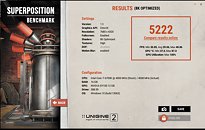
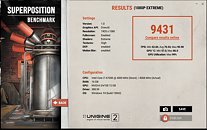
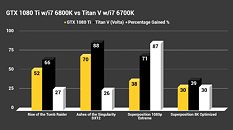
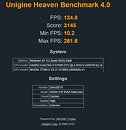
Poring through a Reddit discussion on the Titan V's prowess, the amount of benchmarks already in the wild is overwhelming, but a clear picture is easy to get: the Titan V is the world's most powerful gaming card at the moment, delivering a better experience in every setting, game, and workload (be it VR gaming or rendering) than any other GPU.
In Futuremark's VR Mark "Blue Room" benchmark, for instance, the Titan V easily delivers a score of 4,400 points - compared to the benchmark's own base premium high-end PC scores, that's a 1,428 points increase, delivering an above 90 FPS experience, something a GTX 1080 Ti wouldn't be able to achieve under the same settings. On the TimeSpy benchmark, the stock Titan V delivers 11,539 points, around 1,000 points more than the average 10,500 points a GTX 1080 Ti would achieve, paired with the same processor (there are higher 1080 Ti scores, yes; there are also lower.)

The Titan V achieves an average of 65 FPS on max settings at 1440p; an average of 157 FPS on Gears of War 4 on Ultra settings at the same resolution; 76 FPS Average on 1440p, Crazy Preset of the Ashes of The Singularity Benchmark; and a slew of other gaming results that you'd do better in poring through yourself, including Deus Ex: mankind Divided, Fallout 4, XCOM 2, and others.




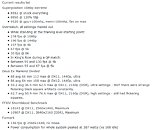
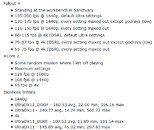
We also have to remember that the Titan V can either be seen as the most expensive gaming graphics card that NVIDIA has ever sold, or as the best price/performance Volta-based computing graphics card. In general compute workloads the Titan V shines again, eking out victory after victory against NVIDIA's other gaming-capable offerings such as the GTX 1080 Ti. This is by no means an extensive coverage, but the Titan V has been benchmarked as delivering 41 seconds GPU time in the V-Ray benchmark, against the 107 seconds that a GTX 1080 Ti managed to deliver (with an equivalent CPU score). On SpecViewPerf 12.1, the Titan V delivers better performance than NVIDIA's professional Quadro P6000 (which goes for $5,000) across all workloads save one. This seems to be the best price-performance ratio for this graphics card, not gaming; so if you're looking for the best possible compute performance and the best gaming experience on the side, the Titan Volta is the only solution.

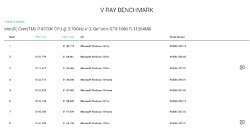
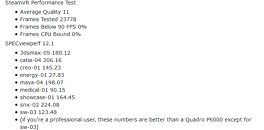
View at TechPowerUp Main Site
In the Unigine Superposition benchmark, the $3000 Titan V managed to deliver 5,222 points in the 8K Optimized preset, and 9,431 points on the 1080p Extreme preset. Compare that to an extremely overclocked GTX 1080 Ti running at 2,581 MHz under liquid nitrogen, which hit 8,642 points in the 1080p Extreme preset, and the raw power of NVIDIA's Volta hardware is easily identified. An average 126 FPS is also delivered by the Titan V in the Unigine Heaven benchmark, at 1440p as well. Under gaming workloads, the Titan V is reported to achieve from between 26% and 87% improvements in raw performance, which isn't too shabby, now is it?




Poring through a Reddit discussion on the Titan V's prowess, the amount of benchmarks already in the wild is overwhelming, but a clear picture is easy to get: the Titan V is the world's most powerful gaming card at the moment, delivering a better experience in every setting, game, and workload (be it VR gaming or rendering) than any other GPU.
In Futuremark's VR Mark "Blue Room" benchmark, for instance, the Titan V easily delivers a score of 4,400 points - compared to the benchmark's own base premium high-end PC scores, that's a 1,428 points increase, delivering an above 90 FPS experience, something a GTX 1080 Ti wouldn't be able to achieve under the same settings. On the TimeSpy benchmark, the stock Titan V delivers 11,539 points, around 1,000 points more than the average 10,500 points a GTX 1080 Ti would achieve, paired with the same processor (there are higher 1080 Ti scores, yes; there are also lower.)

The Titan V achieves an average of 65 FPS on max settings at 1440p; an average of 157 FPS on Gears of War 4 on Ultra settings at the same resolution; 76 FPS Average on 1440p, Crazy Preset of the Ashes of The Singularity Benchmark; and a slew of other gaming results that you'd do better in poring through yourself, including Deus Ex: mankind Divided, Fallout 4, XCOM 2, and others.






We also have to remember that the Titan V can either be seen as the most expensive gaming graphics card that NVIDIA has ever sold, or as the best price/performance Volta-based computing graphics card. In general compute workloads the Titan V shines again, eking out victory after victory against NVIDIA's other gaming-capable offerings such as the GTX 1080 Ti. This is by no means an extensive coverage, but the Titan V has been benchmarked as delivering 41 seconds GPU time in the V-Ray benchmark, against the 107 seconds that a GTX 1080 Ti managed to deliver (with an equivalent CPU score). On SpecViewPerf 12.1, the Titan V delivers better performance than NVIDIA's professional Quadro P6000 (which goes for $5,000) across all workloads save one. This seems to be the best price-performance ratio for this graphics card, not gaming; so if you're looking for the best possible compute performance and the best gaming experience on the side, the Titan Volta is the only solution.



View at TechPowerUp Main Site





